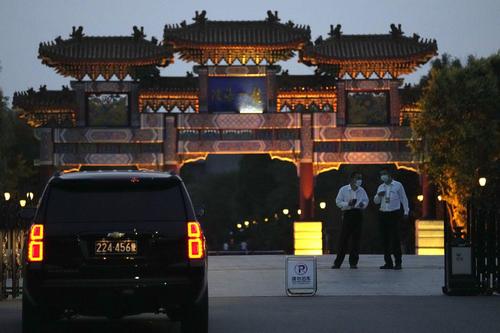US-China Tianjin Talks “Stopped Short Of Actually Negotiating Anything”
The general consensus in the aftermath of Monday’s high level diplomatic meeting between US officials led by Deputy Secretary of State Wendy Sherman with the Chinese delegation led by Vice Foreign Minister Xie Feng in the northern Chines port city of Tianjin is that the only ‘positive’ outcome is that the hostilities weren’t on as open a display as in Alaska previously. But they were still bad enough given the clear hardening of positions on each side.
As we detailed before the Chinese side presented no less than two lists of grievances – or essentially things the Biden administration must rectify before any real diplomacy can take place, focusing on lifting sanctions and all travel restrictions on Chinese officials, and revoking policies which see Chinese media as ‘foreign missions’.

Going in, the US side hoped that this meeting would at least soften the diplomatic and economic standoff enough to avoid open conflict, but as Reuters summarizes in the aftermath it remains that “the combative statements that emerged from the meeting – albeit coupled with suggestions from officials that closed-door sessions were marginally more cordial – mirrored the tone set in Alaska in March, when the first senior-level diplomatic talks under President Joe Biden were overshadowed by rare public vitriol from both sides.”
“While Tianjin did not expose the same degree of outward hostility that was on display in Alaska, the two sides appeared to stop short of actually negotiating anything, sticking instead to lists of established demands,” it qualifies.
As expected Sherman went after China’s human rights and anti-democracy record in places like Hong Kong, Xinjiang, and Tibet. This after going into the trip State Dept. spokesman Ned Price asserted she’d be entering the talks “from a position of strength”. But the Chinese was determined to deflate this assessment, insisting the ball is in the US court and that it must act (which Xie underscored in presenting the “lists”) “When it comes to respecting international rules, it is the United States that must think again,” he said while presenting the demands.
One anonymous US official was quoted in Reuters however as insisting, “It is going to be up to the Chinese side to determine how ready they are as well to… take the next step.”
China accuses US of creating ‘imaginary enemy’
Chinese officials said Washington was not qualified to level criticism on human rights during a rare face-to-face mtg in Tianjin. https://t.co/mTh65d70zG
The CCP feels free to denounce the Biden Admin at every turn.
— Laura Ingraham (@IngrahamAngle) July 26, 2021
Finding any kind of common ground as a basis on which to move forward is likely to prove elusive for the time being, given especially given the following:
Indications are, meanwhile, that the Biden administration may scale up both enforcement actions impacting Beijing – such as cracking down on Iranian oil sales to China – and coordination with allies in the context of countering China, including another summit later this year that Biden is keen to host with the leaders of Japan, Australia, and India.
Biden’s White House also has given few signals that it intends to roll back tariffs on Chinese goods established under the Trump administration.
So ossification does indeed appear the apt word describing the takeaway from this week’s Tianjin talks. Alarmingly it comes as Washington has gotten its ally Japan to come around to its side on presenting a more muscular rhetorical posture on the Taiwan question, something fast raising the temperature in the region.
Meanwhile Bloomberg notes that the two sides appeared to leave open the possibility of Presidents Biden and Xi actually meeting in a future face-to-face summit, but that would entail actual preparatory negotiations, and we still seem a long way from that.
Tyler Durden
Tue, 07/27/2021 – 12:10
via ZeroHedge News https://ift.tt/2UXXh0q Tyler Durden